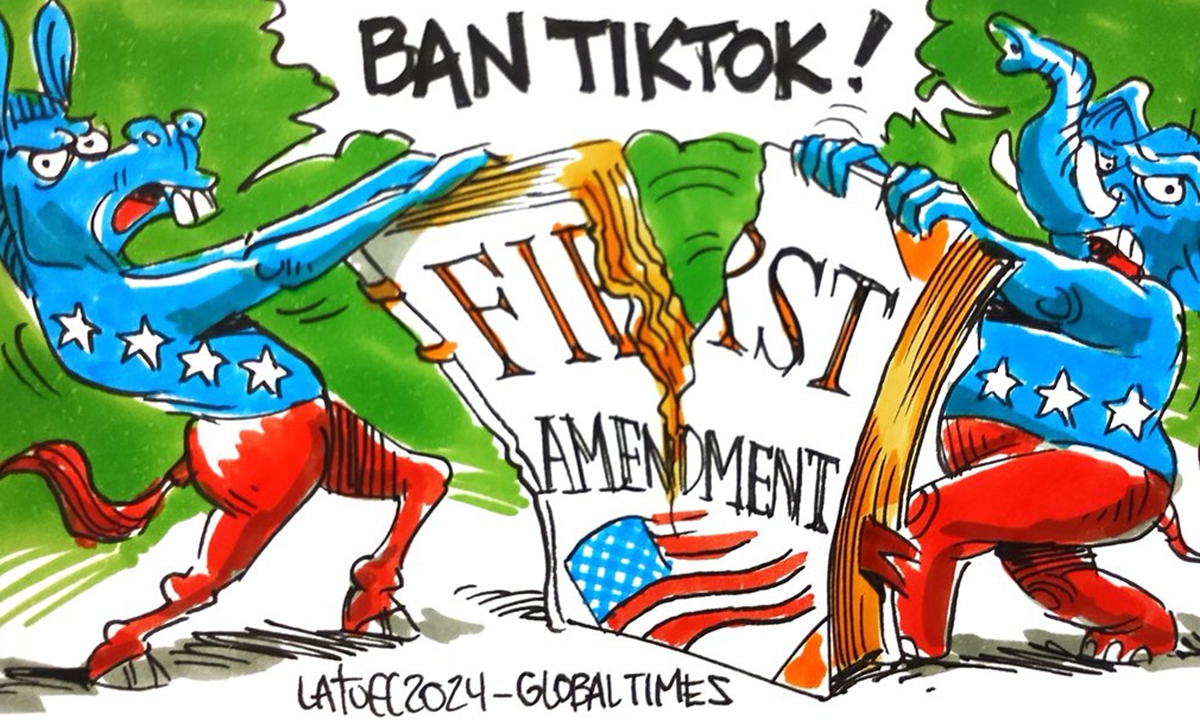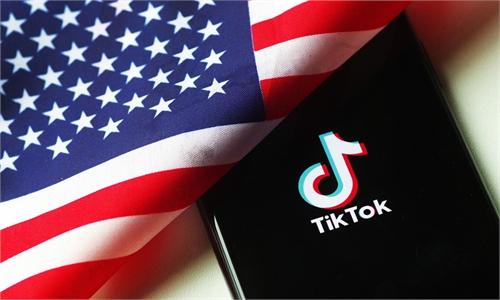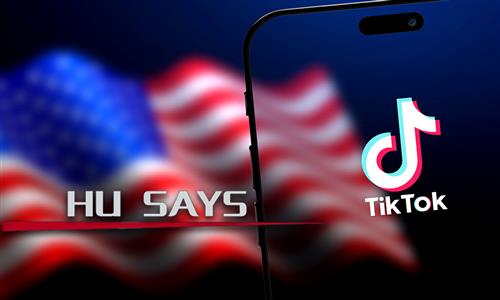
The US' crackdown on TikTok tramples upon its First Amendment rights. Cartoon: Carlos Latuff
German Chancellor Olaf Scholz has become the latest Western political leader to open an account on TikTok, an ultra-popular video-sharing platform owned by Chinese company ByteDance that is undergoing attacks from some Western countries, especially the US, due to "national security concerns."
Analysts said the growing numbers of Western politicians opening TikTok accounts not only proves the vitality and competitiveness of the platform, but also shows the accusation that the app is a "national security threat" is untenable. Attacking TikTok while using the platform will only show the hypocrisy of some politicians, whose real intention is to suppress the development of Chinese tech companies.
In the first video posted by Scholz's account, the German Chancellor sits at his desk, showing a glimpse of his office. He also announced his TikTok channel on X, formerly Twitter, saying "I won't dance. Promised." according to the DW.
According to German government spokesperson Steffen Hebestreit, the TikTok channel aims to connect with a younger audience, as the German government "has to go where citizens go to get information."
Before Scholz, senior Western politicians including US President Joe Biden, French President Emmanuel Macron, Simon Harris, Ireland's prime minister-in-waiting and German Health Minister Karl Lauterbach have all created TikTok accounts.
A Politico report on Monday believes that embracing TikTok is more linked to election campaigning and attracting younger voters. Scholz's decision marks "a new approach" from the German government, which has previously ordered its ministries' staff to shun the app on work-related devices.
He Zhigao, a research fellow with the Institute of European Studies from the Chinese Academy of Social Sciences, told the Global Times on Tuesday that TikTok is a popular entertainment platform for most people, and when political figures have presence on it, it helps shape an image of being people-friendly.
As a commercial app, TikTok is bound to face competition, and even legal or political suppression in other countries, but the growing numbers of Western politicians are choosing to sign up to TikTok, which shows TikTok's vitality and worldwide influence, He said.
Given Scholz is scheduled to travel to China in mid-April, opening a TikTok account before the trip to some extent shows his pragmatic attitude toward China, He noted.
Also on Monday (US local time), the US Senate Republican Leader Mitch McConnell hyped that TikTok poses "a serious threat" to US national security, as China uses it as a "tool of surveillance and propaganda," according to The Hill.
In March, the US House of Representatives passed a bill to force TikTok's China-based parent company ByteDance to divest the US assets of TikTok, or face a ban. However, uncertainties remain as the bill still needs to be reviewed in the Senate.
According to the count by Politico, more than a dozen Democratic lawmakers in the House who voted for the TikTok bill have a TikTok account. Biden's campaign team defended his use of TikTok as "using it to reach voters in a more fragmented and personalized media environment."
Shen Yi, a professor at Fudan University, told the Global Times on Tuesday that the increasing number of Western political figures opening TikTok accounts proves that the so-called "national security threat" accusation against the platform is untenable.
By attacking TikTok, some US politicians have shown the world their contradictions and hypocrisy, and their real intention is to suppress the development of Chinese tech companies, Shen noted.
The US wants to steal TikTok from China, not entirely kick it out, as banning TikTok would have a ripple effect they cannot afford in an election season, the expert added.
For some Western politicians, TikTok poses a "political problem," but banning it would also be a political problem as well, Zhang Yiwu, a professor of cultural studies at Peking University, told the Global Times on Tuesday.
According to Zhang, TikTok shows the success of Chinese products and competitiveness. Moreover, as a combination of globalization and technological development, TikTok represents a general trend of the times, which cannot be stopped by some selfish politicians.




